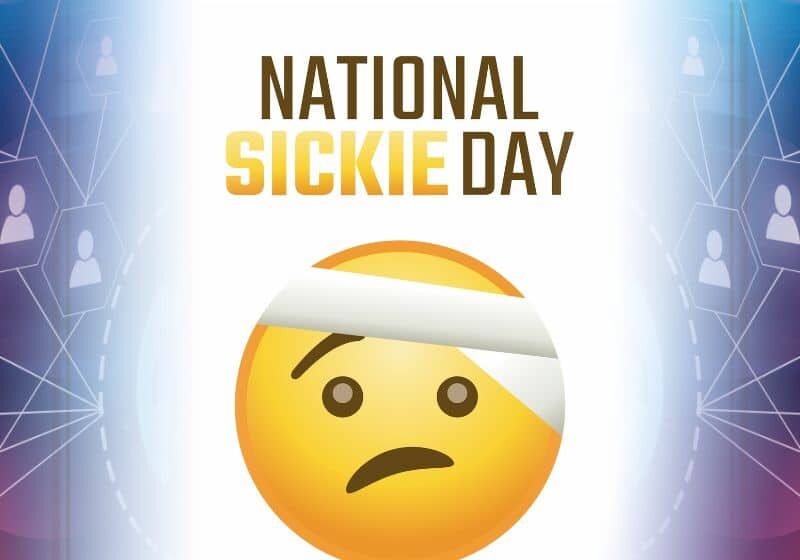National Sickie Day rethinking Workplace Absences

National Sickie Day falls on the first Monday of February. It’s an unofficial occasion marked by a notably high number of employees calling in sick. Originally identified by research in 2011, National Sickie Day sees upwards of 375,000 employees call in sick, citing reasons ranging from genuine illness to more dubious excuses.
The term has sparked debates about why employees might feel compelled to take unplanned days off, including workplace culture, mental health, and work-life balance concerns.
It presents an opportunity for employers, especially within Small and Medium Enterprises (SMEs), to look into absences.
Employers must approach each reported absence with an open mind, resisting the temptation to let the day’s notoriety cloud their judgment. The focus should be understanding the genuine reasons behind an employee’s decision to call in sick, adhering to established absence management procedures without prejudice.
The ripple effect on businesses
For SMEs, National Sickie Day, and more broadly, unplanned absence, will have a particularly pronounced impact due to their limited resources and smaller workforce.
An unexpected spike in absences will disrupt day-to-day operations, affect service delivery, and place additional pressure on present employees.
Beyond the immediate operational impact, there are financial implications, including lost productivity and potential overtime costs for covering absent staff.
High absence rates, particularly if seen as unwarranted, will affect team morale and foster resentment among staff who feel they are picking up the slack.
The Opportunity for Reflection and Improvement
National Sickie Day is a chance for introspection and improvement within the organisational culture. High absence levels often signal deeper issues such as lower employee engagement, morale, and retention challenges. These absences can also suggest underlying mental health concerns, with individuals possibly opting to report physical ailments over mental health issues due to stigma or fear of judgment.
Promoting Mental Health and Wellbeing
This day serves as a reminder for employers to actively foster a supportive environment around mental health. Encouraging open conversations, destigmatising mental health struggles, and enhancing awareness will improve the workplace atmosphere. Implementing initiatives like mental health first aiders or an Employee Assistance Programme (EAP) will offer substantial support. Additionally, reminding employees about available resources and support systems reinforces a culture of understanding and empathy.
The Economic Impact of Absences
Handling absences is a challenging but unavoidable aspect of operations for many businesses. According to the CIPD, the average UK employee is absent for 7.8 days, potentially costing the UK economy around £100 billion. Absenteeism is far from a minor inconvenience and could represent a significant financial burden for your business.
The Importance of Absence Monitoring
Implementing effective monitoring systems and accurately documenting sickness absences are critical steps for any business aiming to manage absence issues effectively. These measures help understand the financial implications of absenteeism and identify patterns that could suggest deeper problems.
Proper monitoring systems will bring to light absence trends that might otherwise go unnoticed in the hustle and bustle of daily operations. By identifying these patterns, business owners are able to offer targeted support to their employees, potentially reducing or even preventing future absences.
Recognising Red Flags and Avoiding Disability Discrimination
SMEs must recognise signs that an employee’s frequent short-term absences might be related to a disability. Unexplained or inconsistent reasons for absence, a drop in performance, or visible signs of distress or discomfort can be red flags. Under the Equality Act 2010, employers must make reasonable adjustments for employees with disabilities. Ignoring these signs can lead to unintentional discrimination.
To avoid discrimination:
● Engage in open, empathetic dialogue with employees about their needs.
● Seek consent to obtain occupational health or medical advice if a disability is suspected.
● Implement recommended adjustments promptly and review their effectiveness regularly.
Strategies for SMEs
SMEs, in particular, stand to benefit from re-evaluating their sickness absence and wellbeing policies. Implementing clear, fair short-term sickness absence policies and conducting return-to-work interviews can help address and mitigate short-term absences effectively. These practices aid in identifying potential red flags that require a need for further support or adjustments and contribute to a culture of transparency and trust.
Develop and Communicate Clear Policies: Establishing and communicating the procedures for reporting sickness and managing absences is vital to ensure consistency and fairness in handling instances.
Conduct Return-to-Work Interviews: These interviews can be invaluable in understanding the reasons behind absences and discussing any necessary support or adjustments to facilitate a smooth return to work.
Monitor and Address Absence Patterns: Monitoring absence trends can help identify issues like workplace stress or dissatisfaction, enabling timely interventions.
Support Employee Wellbeing: Investing in initiatives that promote physical and mental well-being can prevent sickness and absence, creating a more resilient and engaged workforce.
Conclusion
Managing short-term sickness absence effectively is crucial for the health of both the workforce and SMEs, particularly in light of National Sickie Day and the unique challenges it highlights. Implementing thoughtful policies, and supporting employee well-being. As well as being mindful of the nuances of disability discrimination, and utilising the right tools to track and analyse absence data are essential steps towards creating a positive and productive work environment. These practices, underscored by the reminder of National Sickie Day, are not just critical for a single day but are vital throughout the year. By recognising the importance of robust strategies to manage absences, businesses will ensure a healthier, more engaged, and efficiently functioning workplace.
At HR4UK, we understand the complexities involved in managing the ‘people stuff’ and the impact it can have on your ability to focus on your core business activities. Our comprehensive HR solutions are designed to lift the weight of these concerns, providing you with the expertise and software needed to address short-term sickness absence head-on.
Whether you’re looking to refine your existing policies, introduce new procedures, or seek a software solution that simplifies absence management, HR:4UK is equipped to assist. Our goal is to give you back the time and peace of mind to concentrate on growing your business, ensuring you’re well-prepared to turn the challenges posed by National Sickie Day into opportunities for improvement and growth.
For further information on our HR solutions please visit our Services page.
Angela Clay
A qualified employment law solicitor and our managing director, Angela has unparalleled legal expertise and decades of experience and knowledge to draw from. She’s a passionate speaker and writer that loves to keep employers updated with upcoming changes to legislation, and is a regular guest speaker on BBC Leicester Radio.




